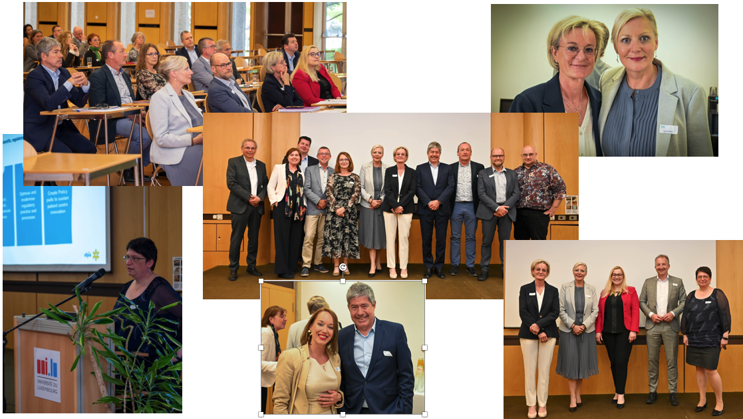Innovative Medicines for Luxembourg (IML) - Connecting the dots to enhance the innovation ecosystem
05.05.22
It is great to be able to travel again more freely and meet our members and stakeholders in person. Together with Magda Chlebus, EFPIA Executive Director for Science Policy and Regulatory, we got to witness last week the launch of refreshed image, vision and mission of EFPIA's newest member association in Luxembourg - IML, who celebrated its 10 years anniversary. IML stands for Innovative Medicines for Luxembourg with a mission to promote the best healthcare by encouraging therapeutic innovation in the field of medicines for human use. In other words, it means creating the environment for faster access to new treatment options for Luxembourgish patients, said Sonia Franck, the Secretary General of IML. For the first time Luxembourg was participating in collection of data to EFPIA W.A.I.T indicator survey [1], and the results were presented to the multi-stakeholder audience. Franck hopes the indicator will be a tool to discuss with stakeholders about the elements that can improve faster access to innovation and the news about the EFPIA members commitment to track the pricing and reimbursement filings and transparently report them through a portal were much welcomed.
The Grand Duchy of Luxembourg of ca 650,000 inhabitants could be truly characterised as a small think tank or a laboratory. The annual conference of IML had a line of excellent speakers to discuss the possibilities. Dr Jochen Klucken, Professor of Digital Medicine at University of Luxembourg, outlined how digital therapeutics are a paradigm shift from providing better health not only through a tablet or capsule but in fact by software that drives evidence-based therapeutic interventions to prevent, manage and treat symptoms or a disease. He explained how digitalisation will become part of patient-care every day and gave a worthwhile tip to the pharmaceutical industry to follow and benefit from the German Competent Authority's (BfArM) fast-track process (DiGA) for digital therapeutics [2]. There is great interest from other European countries to adopt similar mechanisms to support future digitalised innovation.
The Grand Duchy of Luxembourg of ca 650,000 inhabitants could be truly characterised as a small think tank or a laboratory. The annual conference of IML had a line of excellent speakers to discuss the possibilities. Dr Jochen Klucken, Professor of Digital Medicine at University of Luxembourg, outlined how digital therapeutics are a paradigm shift from providing better health not only through a tablet or capsule but in fact by software that drives evidence-based therapeutic interventions to prevent, manage and treat symptoms or a disease. He explained how digitalisation will become part of patient-care every day and gave a worthwhile tip to the pharmaceutical industry to follow and benefit from the German Competent Authority's (BfArM) fast-track process (DiGA) for digital therapeutics [2]. There is great interest from other European countries to adopt similar mechanisms to support future digitalised innovation.
Magda Chlebus from EFPIA showed the great concerns over the fact that Europe's research and development base is gradually eroding. Currently 48% of new medicines originate from the US which is over double as much as in Europe (22%). The issue for Europe over the life span of the Pharmaceutical and Industrial strategies is where that innovation happens. It impacts patient access to new therapies, Europe's economic growth and inward investments and on the resilience to handle future health threats.
Dr Anna Chioti (MD, MPH) who heads the division of pharmacy and medicines in the Ministry of Health explained the role the tight collaboration between the stakeholders in tackling COVID-19 pandemic. "We could do things much faster, be more pragmatic, when we had to - why should we stop here?", she asked. Luxembourgish medicines regulator has seemingly a future-orientated vision that takes a transversal approach. Collaborations with industry, universities, companies, healthcare provides, patient associations and governments and regulators elsewhere in Europe are essential to ensure that the benefits are realised in practice. The implementation of the EU Pharmaceutical Strategy is a great example. Thus, adapting regulatory approval processes, valuing and rewarding innovation, developing new financing models, implementing new pathways and infrastructures for integrated care delivery and the digitalisation of health data will be able to bring more effective and targeted treatments to patients.
It truly matters where innovation is happening and IML's event provided the inspiration to really look at the country's vivid life science sector. Luxinnovation strategy 2022-2025 [3] was just launched and encapsulated its mission that goes along two dimensions; at a company level, and the level of the economy as a whole. It aims to provide opportunities and foster collaborative innovation projects that stimulate the development of a sustainable, competitive and digital economy. EFPIA is happy to have tighter connections with Luxembourg going forward and in particular with IML and its members.

Photos: Eric Mertens, DSB Communications & Daniel Katzenmeier, Gollics Fotografie

Photos: Eric Mertens, DSB Communications & Daniel Katzenmeier, Gollics Fotografie

